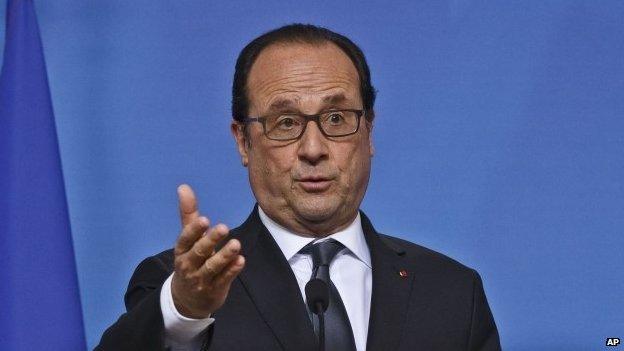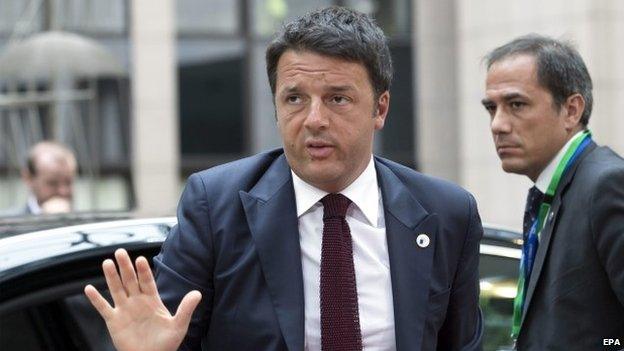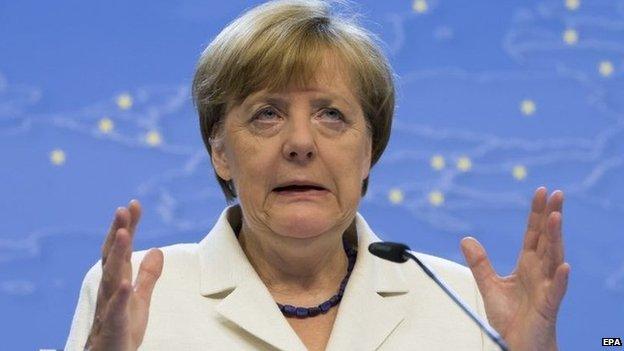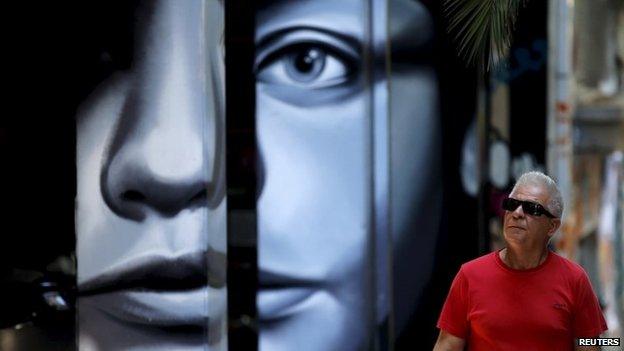Greece debt crisis: Yawning rifts between European superpowers
- Published
- comments

French President Francois Hollande wanted to preserve the EU principle of solidarity
This is no glorious victory. No triumph to be savoured.
Eurozone leaders emerged bleary-eyed after a night of marathon talks, with a "We did it!" message on a deal with Greece.
But how did they do it? And what did they do exactly?
This is no signed and sealed rescue package for Greece. No immediate vision for getting Greece back on its feet, financially secure in the long term.
There is no talk of an explicit reduction in Greece's debt, which economists worldwide point to as unsustainable.
Instead, this "agreement" is a basis for negotiating the terms of a new bailout, with various measures to keep Greece afloat in the meantime.
But a happy French President Francois Hollande announced an important result of negotiations was the preservation of the EU principle of solidarity.
Really?
There probably would have been no agreement at all had it not been for him and his Italian counterpart, Renzi.

Prime Minister Matteo Renzi played a key role in the deal being reached
Germany tight-lipped
Time and again overnight the fractious meeting of the 19 eurozone leaders was interrupted for bilateral talks (probably rows).
Mr Hollande went into the meeting on Sunday, saying he would do everything to keep Greece in the eurozone.
Germany, by comparison, was tight-lipped and tight of purse string.
Chancellor Angela Merkel is under pressure from the German public - the largest contributors to Greek rescue funds - and lawmakers in her own party to keep a tough line on Greece.
Far from an impression of EU solidarity, therefore, what was on public display were yawning rifts between European superpowers.

Germany and France managed to bridge the gap between them
And smaller players too.
Countries in the east, including Lithuania, where pensions are half the size of those in Greece, countries such as Portugal, Spain and Ireland that have undergone tough austerity themselves - they were not well-disposed to "letting Greece off the hook". Though they did not want it to leave the eurozone.
And the word "trust" came up over and over again.
After months of toing and froing and about-turning from the Syriza government - which broke pretty much every rule in EU diplomatic etiquette - and on the back of five years of successive Greek governments breaking their word in bailout agreements - good faith was in very short supply.
"Trust can be re-built," Mrs Merkel has said.
Let's see.
Is it a sign of trust that the hated (from the Greek perspective) troika, that is, representatives of Greece's creditors - the International Monetary Fund (IMF), the European Central Bank and the European Commission - will now be a hovering permanent presence in Athens, ensuring that is are dotted and tees crossed on every detail of a reform programme stapled to rescue funds coming to Greece?

How will people back in Greece eye the deal thrashed out in Brussels?
A high-level banking source told me the conditionality of a deal could be one of the toughest of IMF programmes worldwide. "Including the poorest of developing nations," he said.
Twitter is alive with dramatic declarations that Greece - the country that saw the birth of democracy - will now be subsumed in dictatorship, as the troika "takes over" as many will see it.

Key points of the deal
The Greek parliament must immediately adopt laws to reform key parts of its economy - by Wednesday. The reforms include: streamlining the pension system, boosting tax revenue - especially from VAT, liberalising the labour market, privatising the electricity network, extending shop opening hours
The eurozone agrees in principle to start negotiations on a loan package for Greece worth €82bn-86bn (£59bn-£62bn; $91bn-$96bn)
The loan will come mainly from the European Stability Mechanism (ESM) - the eurozone bailout fund. But the International Monetary Fund will also be asked to make a contribution from March 2016
A new trust fund will be set up, managed by Greece, with €50bn of Greek assets. It is a mechanism for paying off part of the total ESM loan.

Self-interest
That brings to mind two points.
Prime Minister Alexis Tsipras said he had democracy on his side 10 days ago after the majority of Greeks voted "No" - as instructed by him - in a referendum on tough bailout conditions.
Yet he has now signed up to those very conditions and more.
Another thought is that Greece is not alone in now facing a loss of national sovereignty.
So are all the other countries in the eurozone.
There has long been talk of the need for closer union and harmonisation in the single currency.
This crisis over Greece makes its tightening, unifying and strengthening seem more urgent - to preserve the credibility of the currency.
In the end, it was not the plight of tiny Greece that drove eurozone leaders to overcome pride, suspicion, distrust and misgivings to reach some kind of accord.
It was self-interest.
Remember, the eurozone is only just clawing its way out of its 2008 financial crisis.
Greece's fate affects the economics and the politics in every single eurozone nation.